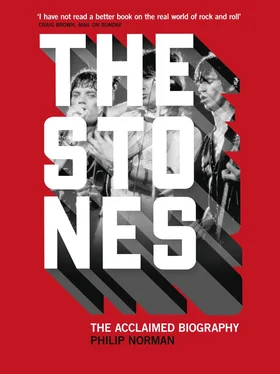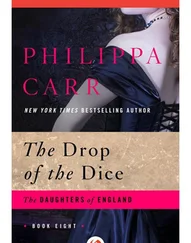In those days, there were people who could talk to Mick about his apparent rejection of two very pleasant, if deeply ordinary, parents. Paul McCartney had a long talk with him about it one night when the Beatles and Stones were out together. McCartney got on well with his widower father, and all old people, and was depressed by Mick’s dogged insistence, against much evidence to the contrary, that parents were ‘a drag’. Everything was ‘a drag’, it seemed, which did not supply lustre to his still undecided image.
To so natural a mimic, those early road shows as supporting attraction to big American stars were like a series of lessons in pop idol behaviour and deportment. He had watched the Everly Brothers, singing to one another like blow-waved, cooing narcissists. He had seen Little Richard, a rock ’n’ roll master whose music had always been strangely ambiguous of gender, and who now took to the stage in full make-up, complete with nail varnish. It was on the Little Richard tour that Jagger asked a Liverpool musician, Lee Curtis, how he could find out about theatrical make-up. Curtis’s brother, Joe Flannery, sat him down backstage and showed him how to apply actors’ pancake and rouge.
Chrissie Shrimpton had watched Jagger’s growing awareness of himself as something more than merely a constituent of the Stones’ democracy. To Chrissie, he still pretended it was all for a laugh; that the normal, sensible part of him stood back and laughed when little girls screamed for him. But then, if they were out together and girls waylaid them, to Chrissie’s great irritation, Mick would pretend not to be with her – even ask her to make herself scarce. The Beatles might have lost followers after the revelation that John Lennon had a wife. It was better for Mick’s image – so Andrew Loog Oldham said – if he seemed to have no steady girlfriend.
Chrissie felt slighted by Mick’s apparent willingness to let Andrew Oldham rule and dominate him – accepting, for instance, Oldham’s firm rule that girlfriends were barred when the Stones travelled on tour. Mick’s closeness with Oldham was starting to cause comment among Chrissie’s friends who saw them together in pubs, deep in purported musical strategy. Chrissie Shrimpton, in no doubt about Mick’s virility, was nettled when a female acquaintance asked, ‘At that flat, do Mick and Andrew sleep in the same bed?’
Brian Jones was now living in considerably greater comfort than his former flatmates, having managed to billet himself with the parents of his girlfriend, Linda Lawrence, at their house in Windsor. The arrangement was, of course, based on the idea that Brian’s intentions towards Linda were honourable. Before the opposite proved to be the case, the Lawrences showed him every consideration. He was allowed to use Mr Lawrence’s car whenever he wished. The name of the house was even changed, in Brian’s honour, to ‘Rolling Stone’. And he did seem infatuated with Linda. On tour, he would shower her with postcards – to ‘darlin’ Linda’ – and on his return buy her expensive presents. These included a French poodle and a goat which Brian liked to take for walks through Windsor on a lead.
His passion for Linda seemed to fade in proportion to the progress of her pregnancy. He was soon on the move again, forsaking the Lawrences’ hospitality for a small flat in Chester Street, Belgravia. The birth of a son to Linda completed the alienation process. Brian was seldom other than indifferent to the baby, to whom, in a mood of mischievous malice, he gave the same name as his child by Pat Andrews – Julian Mark. ‘He was so rude about that poor little kid,’ Shirley Arnold, the Stones’ fan club secretary, remembers. ‘He used to call it Broad Bean Head.’
As Brian tired of Linda, his indifference curdled into physical cruelty. On her visits to him in Chester Street, he would sometimes knock her about so violently that his downstairs neighbours – another group, the Pretty Things – could hear bumps and crashes through the ceiling.
To Brian all that mattered was the living of his longed-for role as a pop star. He loved being famous, being recognized, pursued and mobbed by girls – for himself now, not as a counterfeit Beatle. He loved having money, having girls, having wine, having clothes. He loved the pop-star night life at clubs like the Ad Lib, the Establishment, Whipp’s and Scotch of St James’s. He loved the shopping raids on boutiques in corduroy, button-down blocks on either side of Carnaby Street. Brian was the Stone nominated as Rave magazine’s Best-Dressed Pop Star of the Week. He thought nothing of spending £30 on one French Jacket from Cecil Gee’s, £10 on a single silk shirt from Just Men. What he did not buy he would cheerfully steal. The striped jersey, copied by boys all over Britain after Brian wore it on Ready, Steady, Go , had in fact been stolen from the wardrobe of one of his Pretty Things neighbours.
The Pathé newsreel film, shot backstage at Hull ABC cinema, shows what a masterly performer Brian was offstage as well as on. In that film, he appears choirboy innocent, concerned only with tuning his guitar. He would sit down with pimply teenage provincial journalists, the soul of amiability, speaking in that voice so soft, it was almost effeminate, his gold-fringed eyes open wide with incredulity at the attitude of the latest hotel to refuse the Stones accommodation, though – as likely as not – it would have been Brian’s own behaviour that precipitated the ban. ‘The Scotch Corner Hotel … near Darlington … ooh, that’s a terrible place. So aggressive .’
Within the Stones, in their claustrophobic tour life, Brian was invariably the source of any disagreement or disruption. They were all waiting in the wings one night when Keith went for him with both fists, shouting, ‘Where’s my chicken, you bastard?’ Brian, before the show, had filched and eaten Keith’s portion of the only food they would be likely to get that night.
Brian continued to regard himself as leader of the Rolling Stones, and as such entitled to a higher pay-out and superior hotel rooms, all the time in blissful unawareness that his secret negotiations and subterfuges were well known to the other four. In those heady early days, the others were content to take out their resentment of ‘Mr Shampoo’ in comparatively harmless ways. Mick and Keith both developed impersonations of Brian based on his physical defects – the too short legs he attempted to hide on stacked-up Cuban heels; the foreshortened neck which made his chin rest, never quite comfortably, on the roll-top of his sweater. The subtle ragging of Brian increased on a trip with Oldham to Northern Ireland to make a documentary film, directed by Peter Whitehead and entitled – in honour of its least willing participant – Charlie Is My Darling . ‘Brian really went over the top whenever Peter Whitehead’s camera was on him,’ Oldham says. ‘He’d do these long soliloquies to camera. “Why am I a musician … and who am I?” He didn’t realize the others were sending him up rotten.’
What no one could deny was the strength and drive Brian gave to the Stones by sheer musicianship. His preposterous egotism, his amoral willingness to do anyone down and filch anything, were forgotten as soon as he picked up his slide guitar or played harmonica, his cheeks filling and hollowing with the quick, light, dancing breath that kept the whole sound together.
‘Brian was a power in the Stones as long as he could pick up any instrument in the studio and get a tune out of it,’ Oldham says. ‘As soon as he stopped trying, and just played rhythm guitar, he was finished.’
The process had already begun which was to define the power structure within the Stones, binding Mick and Keith together in their unstoppable alliance and leaving Brian irretrievably out in the cold. It began on the night that Andrew Loog Oldham locked his two flatmates in the kitchen of their Willesden basement and threatened not to let them out until they had written a song.
Читать дальше












